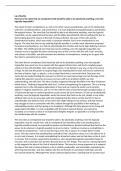Lara Machin
How far is the claim that an omnipotent God should be able to do absolutely anything, even the
logically impossible?
The extent of God’s omnipotence, as well as his other nature and attributes such as his relationship
with time, omnibenevolence, and omniscience, are much disputed among philosophers and thinkers
throughout history. The view that God should be able to do absolutely anything, even the logically
impossible, can be supported by Descartes and the Bible, but ultimately fails at justifying the due to
this breaking down the nature of the God of classical theism, the issue of free will, and the
Omnipotence Paradox, which may make us question whether God is even omnipotent to any
degree. The view that God can do anything logically possible is a rather weak alternative proposed
by Aquinas and Swinburne, as it fails to acknowledge the miracles and clearly logic-defining events in
the Bible. The middle-ground view that God can do anything, even the logically impossible, but
chooses not to is arguably the most convincing view as this is in line with free will, God’s miracles,
and actions in the Bible, and still maintains the attribute of omnipotence, leading me to agree with
the claim to somewhat of an extent.
The claim that an omnipotent God should be able to do absolutely anything, even the logically
impossible may seem true to an extent with the support of Descartes and God’s complete power,
which is in line with the Bible. God, claimed Descartes, is not limited in any way, as he is the source
of logic, he also has the power to suspend logic, thus implying that he does not have to conform to
the laws of nature, logic, or physics, as he created them and so can break them. Descartes also
claims hat not understanding this concept is a limit of our own human logic and not the logic of Gd,
making this argument sound as any issues we have with it are problems within our own
understanding, not with God. This idea is further supported through the Bible in the New Testament
which claims, “Nothing is impossible with God”, further strengthening the argument. This is a strong
argument as it is the only logical explanation of how God can create the world, work miracles,
appear in religious experiences, and so is in line with the idea of God that people accepted today, as
a God bound by logic or maximal greatness surely cannot be God. However, if God can do absolutely
anything, even the logically impossible, surely this means that God can be evil, stupid, or any other
attribute that we do not associate with God, implying that this God is not the God of CT, but an
unpredictable and arbitrary God, as his moral rules might change at any minute, and that humans
may struggle to have a connection with him, evident through the possibility of him making an
unbreakable promise and then going on to breaking it. Although this idea appears to be strong and
supported by the Bible, it is not compatible with the God of classical theism, and cannot be
accepted, as it creates an idea of an impersonal almighty designer as opposed to a loving God who
has relationships with his creation.
The view that an omnipotent God should be able to do absolutely anything, even the logically
impossible, may be a weak view, and an omnipotent God should be able to do anything that is
logically possible instead, as proposed by Aquinas and Swinburne. Aquinas believed that God has the
power to do whatever is logically possible to do as he claims, “whatever involves a contradiction is
not held by omnipotence”, such as God turning a circle into a square; it is simply doesn’t make
sense. This also means that anything that contradicts God’s all perfect nature, he is not able to do. it
is not a lack of power, it is simply contradicting his all-perfect nature and so God does not do it, such
as sinning. This is further supported by Swinburne, who argued that logically impossible things do
not exist, and so God does not do them because they are not ‘things’. This may be a strong argument
as this supports the idea of the God of classical theism. This may be a strong argument as is supports
the idea of the God of classical theism as he is reliable, predictable, and immutable, maintaining his
all-loving characteristic, and also explains why the world works in accordance with logic and why
God cannot break this. Although Peter Geach criticises Aquinas here, claiming that he assumes God




